Related Research Articles

Ultima is a series of open world fantasy role-playing video games from Origin Systems, created by Richard Garriott. Electronic Arts has owned the brand since 1992. The series had sold over 2 million copies by 1997.

Richard Allen Garriott de Cayeux is a British-born American video game developer, entrepreneur and space tourist.

Catacomb 3-D is a first-person shooter video game, the third in the Catacomb series, the first of which to feature 3D computer graphics. It was developed by id Software and originally published by Softdisk under the Gamer's Edge label, released in November 1991. The player takes control of the high wizard Petton Everhail, descending into the catacombs of the Towne Cemetery to defeat the evil lich Nemesis and rescue his friend Grelminar.

Origin Systems, Inc. was an American video game developer based in Austin, Texas. It was founded on March 3, 1983, by Richard Garriott and his brother Robert. Origin is best known for their groundbreaking work in multiple genres of video games, such as the Ultima and Wing Commander series. The company was purchased by Electronic Arts in 1992.
Akalabeth: World of Doom is a role-playing video game released in 1979 for the Apple II. It was published by California Pacific Computer Company in 1980. Richard Garriott designed the game as a hobbyist project, which is now recognized as one of the earliest known examples of a role-playing video game and as a predecessor of the Ultima series of games that started Garriott's career. Garriott is the sole author of the game, with the exception of title artwork by Keith Zabalaoui.
The Avatar is the main player character and protagonist in the Ultima series of video games by Origin Systems. The character was first introduced as "The Stranger" in the 1981 role-playing video game Ultima I: The First Age of Darkness.

Warren Evan Spector is an American role-playing and video game designer, director, writer, producer and production designer. He is known for creating immersive sim games, which give players a wide variety of choices in how to progress. Consequences of those choices are then shown in the simulated game world in subsequent levels or missions. He is best known for the critically acclaimed video game Deus Ex that embodies the choice and consequence philosophy while combining elements of the first-person shooter, role-playing, and adventure game genres. In addition to Deus Ex, Spector is known for his work while employed by Looking Glass Studios, where he was involved in the creation of several acclaimed titles including Ultima Underworld, Ultima Underworld II, System Shock, Thief: The Dark Project and Deus Ex. He is employed by OtherSide Entertainment, where he was part of the development team for now-cancelled System Shock 3. He is currently working on a new immersive sim based on an original intellectual property.
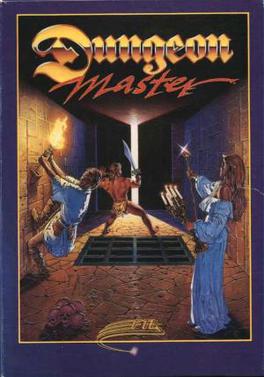
Dungeon Master is a role-playing video game featuring a pseudo-3D first-person perspective. It was developed and published by FTL Games for the Atari ST in 1987, almost identical Amiga and PC (DOS) ports following in 1988 and 1992.

Ultima II: The Revenge of the Enchantress, released on August 24, 1982, for the Apple II, is the second role-playing video game in the Ultima series, and the second installment in Ultima's "Age of Darkness" trilogy.
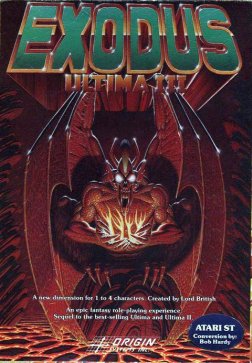
Ultima III: Exodus is the third game in the series of Ultima role-playing video games. Exodus is also the name of the game's principal antagonist. It is the final installment in the "Age of Darkness" trilogy. Released in 1983, it was the first Ultima game published by Origin Systems. Originally developed for the Apple II, Exodus was eventually ported to 13 other platforms, including a NES/Famicom remake.
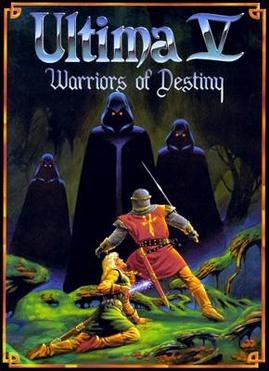
Ultima V: Warriors of Destiny is the fifth entry in the role-playing video game series Ultima released in March 1988. It is the second in the "Age of Enlightenment" trilogy. The game's story takes a darker turn from its predecessor Ultima IV. Britannia's king Lord British is missing, replaced by a tyrant named Lord Blackthorn. The player must navigate a totalitarian world bent on enforcing its virtues through draconian means.
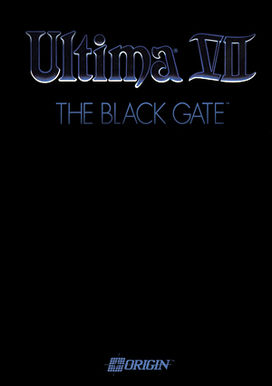
Ultima VII: The Black Gate is the seventh installment of the Ultima series of role-playing video games, released on April 16, 1992. In it, the player returns as The Avatar, a would-be paragon of moral virtue who faces down many dangers and deceptions in order to cleanse the medieval fantasy world of Britannia of assorted plots and schemes, monster infestations, and the undermining of crown authority.
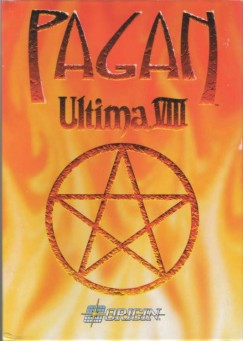
Ultima VIII: Pagan is a role-playing video game, released as the eighth part of the Ultima series. Released in 1994, it is a DOS-only title and is also the first game in the series to be rated M in North America. It was not as well-received as its predecessors, Ultima VII and Ultima VII Part Two: Serpent Isle.

Ultima IX: Ascension is the ninth and final part of the main series of the role-playing video game series Ultima. Developed by Origin Systems and published by Electronic Arts, Ultima IX was released in 1999 for Microsoft Windows after years in development hell. Following the Avatar's escape from Pagan, he is transported back to Britannia for one final battle with the Guardian, who is increasingly ruining the physical and moral fabric of that land by the use of eight columns. The Avatar must fight his way to the runes of virtue found in each of the columns, and cleanse them in the shrines of Virtue, then face off against the Guardian himself.

Ultima Underworld: The Stygian Abyss is a first-person role-playing video game developed by Blue Sky Productions and published by Origin Systems. Released in March 1992, the game is set in the fantasy world of the Ultima series. It takes place inside the Great Stygian Abyss: a large cave system that contains the remnants of a failed utopian civilization. The player assumes the role of the Avatar—the Ultima series's protagonist—and attempts to find and rescue a baron's kidnapped daughter.
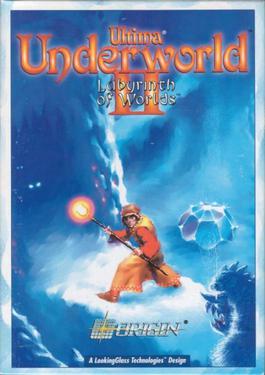
Ultima Underworld II: Labyrinth of Worlds is a 1993 first-person role-playing video game developed by LookingGlass Technologies and published by Origin Systems. As the sequel to Ultima Underworld: The Stygian Abyss, the game is set in the Ultima fantasy universe. Players assume the role of the Avatar—the protagonist of the Ultima series—and adventure through multiple dimensions while seeking to prevent the evil Guardian from achieving world domination. Progression is largely nonlinear and the game allows for emergent gameplay.

Fujisankei Communications International, Inc. (FCI) is the American arm of the Fujisankei Communications Group, a Japanese media conglomerate of television and radio channels, magazine, newspaper, record and video game companies. The Fujisankei Communications Group regroups more than 90 companies, like Fuji TV in Japan, among others. Founded in 1986 in New York City and owned by Fuji Media Holdings, FCI makes productions from the Fujisankei Communications Group available to the United States and the rest of the western world.

Starr McAuley Long is an American game developer, a long time collaborator with Richard Garriott at the companies Origin Systems (1992–2000), Destination Games (2000–2008), and Portalarium (2013–present). In 1997, Long was the original director of the early graphical multiplayer game Ultima Online, and from 2008–2013 he was executive producer at The Walt Disney Company, where he created and managed several educational games and apps for Club Penguin and the Disney Connected Learning platform. In early 2008, he was listed as one of the Top 20 Most Influential People in the MMO industry. In 2013, he again partnered with Garriott at Portalarium, where they began working on a new game Shroud of the Avatar.
This is complete list of works by American science fiction and fantasy novelist Tracy Hickman.
References
- 1 2 3 Shannon Appelcline (2011). Designers & Dragons. Mongoose Publishing. ISBN 978-1-907702-58-7.
- ↑ "Home". nonprophetsradio.com.
- ↑ "Ultima and Lord British". Thedoteaters.com. Retrieved 2016-03-27.
- 1 2 3 Schick, Lawrence (1991). Heroic Worlds: A History and Guide to Role-Playing Games. Prometheus Books. ISBN 0-87975-653-5.
- ↑ "The Sword of Midras". Tor.com. 20 May 2016. Retrieved 9 January 2018.